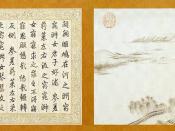Analysis: The short story, "Two Kinds,"� displays the relationship between a Chinese mother and a disobedient Americanized daughter. Jing-mei, a second-generation Chinese daughter, deals with her own internal conflict as well as an external conflict with her mother. The internal effort to find her true self is a lesson Jing-mei will have to discover, as she gets older. Being born of Chinese heritage, Jing-mei struggles with the burden of failing to meet her mother's expectations. She was never sure what she wanted to become. Throughout the story, Amy Tan represents the theme that parents cannot control their children, but can only guide them.
Believing you could be anything in America, Jing-mei's mother hoped for her daughter to become a prodigy. Being born in America, Jing-mei had a very independent and disobedient type of behavior. Jing-mei would take tests from her mother daily, to see if she was extraordinary.
With every test, Jing-mei was unable to become what her mother desired. Because she was never able to have opportunities like her daughter, it was obvious Jing-mei's mother wanted to live her life through her daughter. She wanted to give a life to Jing-mei that she, as a woman, could never have back in China.
The story portrays Chinese mothers to have very high expectations. With broken English, she is presented as a non-emotional mother with a strict attitude. She believed in very traditional values. It is evident that she had high hopes for her daughter, but was too stubborn to hear what Jing-mei wanted. On the other hand, Jing-mei is an extremely Americanized daughter, with a disobedient attitude. Jing-mei must deal with the expectations of her Chinese background. Jing-mei stated, "my mother wanted me to be someone else, but I could only be me."� She is also stubborn, in the same way her mother is. Her mind never listened to what her mother wanted. As a result, they never listened to each other, and ended up being further apart. They could never become close.
As a result of her failures, Jing-mei took lessons on the piano, her mother hoping that she would become a concert pianist. After playing "Pleading Child"� at a recital, unbearably, with wrong notes and rhythm, Jing-mei refused to play the piano again. A feud started and Jing-mei said many things that hurt her mother. In this argument, Jing-mei said, "You want me to be someone that I'm not. I'll never be the kind of daughter you want me to be." Her mother said, "Only two kinds of daughters, those who are obedient and those who follow their own mind."� Later Jing-mei said,"� Then I wish I weren't your daughter. I wish you weren't my mother". Lastly, to hurt her mother, Jing-mei yells, "Then I wish I'd never been born! I wish I were I dead! Like them!"� "Them" refers to her mother's twin baby girls who died back in China. That statement ended the fight.
Over the years, Jing-mei's mother slowly forgave her hurtful words. On Jing-mei's 30th birthday, her mother offered her the piano she had once played. After opening a Schumann book, Jing-mei played the song "Pleading Child."� On the other side of the page, there was a piece titled "Perfectly Content."� She realized they were two halves of the same song. The names of the two-part song are very ironic. In this story the most obvious example of two kinds are the two kinds of daughters the mother identifies, an obedient and the kind that follow their own minds. These songs represent the feelings that the Jing-mei had throughout her life. Jing-mei once was a pleading child, but later she became a perfectly contented woman who can understand that two cultures have shaped her life.





